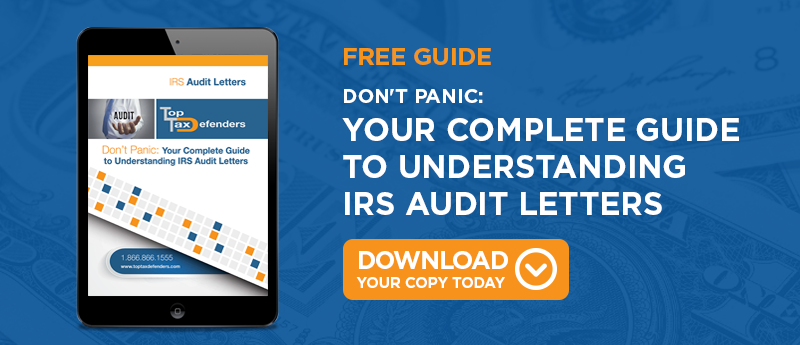
The Internal Revenue Service (IRS) will assign revenue officers (ROs) to check on tax cases that deviate from the norm. It is a revenue officer’s job to assess a case and collect back taxes from businesses and individuals with cases that are out of the ordinary, such as those who owe more than $100,000. An RO is the person most likely to garnish your wages or levy your bank accounts. If the IRS assigns a revenue officer to your case, it means your tax situation is serious. Here’s what to know about when IRS revenue officer involvement might occur and how to fight back.
Small/Simple Debt Collection Starts with ACS
Before the IRS sends out revenue officers, it will start the debt collection process by assigning small, simple tax debts to the automated collections system, or ACS. The ACS is a call center that contacts people and businesses on behalf of the IRS in an effort to collect back taxes. The ACS will review cases and issue notices to those who have not paid the taxes they owe. In general, the ACS will take over small debts and simple cases, such as those with debts of less than $100,000. If you owe more than $100,000 or you have an especially complex case, the IRS might assign an RO to your case instead.
IRS Revenue Officers Take Your Case
Revenue officers play unique roles in the tax debt collection process. The more you know about them as a taxpayer, the better. If the IRS cannot collect your tax debt through the ACS, liens on your assets, or levies on your accounts, it might assign your case to an RO. Your case might also go directly to an RO if you owe a large amount or if your case is unique, such as if the IRS filed a return for you and came back with a large balance to collect. A few facts to know about ROs are:
- A revenue officer is not a revenue agent. An IRS revenue agent is a person in charge of auditing taxpayers. An RO, on the other hand, has the job to collect money. If a revenue agent is contacting you, you might be undergoing an audit and not necessarily debt collection.
- A revenue officer cannot arrest you. If someone knocks on your doorstep with a badge and say he/she is from the IRS, it is an IRS criminal investigation division (CID) agent and you will need to call an IRS tax attorney. A revenue officer’s badge is just a plastic ID card. ROs cannot arrest you. All an RO can do is make a referral to a CID officer (this most often occurs in cases of alleged tax fraud).
- A revenue officer must contact you in person (at least initially). If someone calls you and says he/she is an RO for the IRS and this is your first form of contact, hang up. It’s probably a tax scam. The IRS requires that an RO makes first contact with you in person. You might notice signs of attempts to meet with you in person, such as a card left on your door. Don’t ignore these attempts at contact.
One of the most important things to know about ROs is the limitations of their powers. The IRS Restructuring and Reform Act of 1998 made it more difficult for the IRS to seize assets as a form of debt collection. Therefore, an RO can (in most cases) only levy your accounts receivable, levy your wages and bank accounts, place liens on your properties, and subpoena documents. While you shouldn’t make an RO your enemy, know that the RO cannot seize your home or vehicle to make you pay your taxes.
You Receive a Final Notice of Intent to Levy
After the IRS assigns an RO to your case, you may receive a Final Notice of Intent to Levy if you remain evasive with your taxes. This letter could come at the same time as your face-to-face interaction with a revenue officer, or shortly thereafter. The RO will require actions from you such as presenting the IRS with full financial documentation, filing all tax returns, and undergoing credit checks to assess your ability to repay taxes.
The RO’s investigation of your case will be more thorough and put you under more scrutiny than a general tax agent or the ACS process. Prepare for an in-depth evaluation of your current tax situation. The RO will have the authority to negotiate tax repayment plans and options with you at this time.
Revenue officers generally have much more training than your standard IRS collection agent. The IRS spends a great deal of time and money in training its ROs, making them more skilled than other employees you might have encountered. This means ROs have a greater advantage over taxpayers during payment negotiations. It’s important to retain a tax attorney when dealing with an RO.
Retain a Tax Attorney to Negotiate With IRS Revenue Officers
Protect yourself with an attorney as soon as possible if an RO contacts you. You must immediately prepare yourself to resolve your tax issue. Involvement of an RO is a serious matter, and something you cannot ignore. Waiting too long to respond to the RO’s attempts to contact you can lead to more severe ramifications. Your first move should be to contact an IRS tax attorney who specializes in resolving back tax cases.
Next, you (or your attorney) will contact the IRS to gain a better understanding of the status of your case. You might need to prepare and file unfiled tax returns from previous years or confirm that you have filed all necessary tax returns. There is a chance you could afford to pay what you owe right away. If not, your lawyer can help you negotiate a fair installment agreement or collection alternative.
A tax attorney can make all the difference in the outcome of your case. A lawyer can help you reach a permanent solution that works for you or your business and give you peace of mind in the face of case evaluation from an IRS revenue officer. As soon as an RO contacts you, request experienced professional help from Top Tax Defenders.




